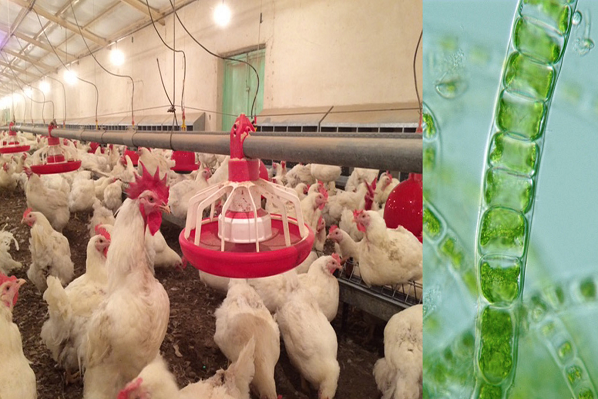Follow us on:
Effects of spirulina platensis on broiler performance
To investigate the effects of dietary supplementations of prebiotics (Lactose and Myco) and Spirulina platensis on broiler performance, carcass yield, and organ weights the trial was conducted. The body weights, average daily weight gain, carcass yield percentage, and feed conversion rate were significantly increased by the dietary inclusion of the prebiotic and spirulina platensis as compared to the control-fed broilers.

Antibiotics are used in the flesh assiduity to help complaints so as to ameliorate meat and egg products. Still, the use of antibiotics in feed redounds in the development of medicine-resistant bacteria, medicine remains in the body of the birds, and imbalance of normal micro foliage.
In addition, the barred use of salutary antibiotics had driven the worldwide implantation of indispensable strategies to help the proliferation of pathogenic bacteria. As a consequence, it has become necessary to develop druthers using either salutary microorganisms or non-digestible constituents that enhance microbial growth.
A probiotic is a feasible microbial salutary supplement that beneficially affects the host, either beast or man, through its goods in the intestinal tract. The bacterial rubrics most frequently used as probiotics are lactobacilli and bifidobacteria although other groups are also represented.
The health-promoting effect of lactobacilli and bifidobacteria in the colon has been substantially associated with their capacity to stimulate the vulnerable response and inhibit the growth of pathogenic bacteria.
Prebiotics – are inedible carbohydrates, which pass through the small bowel and are broken down in the colon. Oligofructose and inulin are considered the standard prebiotics. They aren’t digested in the mortal or carnal small bowel but are widely instigated in the colon by bifidobacteria to short-chain adipose acids, which in turn reduce pH in the colon, produce inimical conditions for the development of pathogenic bacteria and grease resorption of minerals.
Avian species can not digest lactose because they warrant endogenous lactase, hence lactose present in the feed is being digested by intestinal bacteria In the course of these microbial processes more unpredictable adipose acids and lactic acid is released and further microbial proteins are produced. numerous studies have shown that, in discrepancy to other carbohydrates, lactose changes the biota of the large bowel by creating an acidic terrain.
Lower pH reduces the number of pathogenic bacteria, further ammonia is used for the biosynthesis of microbial proteins and lower pH gets into the blood. It has been noticed that when lactose is used as a prebiotic, the number of Lactobacillus reuteri bacteria increases, and the number of Salmonella bacteria in the digestive tract of catcalls decreases.
The most applicable health benefits attributed to the consumption of prebiotics are vulnerable stimulation, improvement of the resistance to contagious conditions, relief of lactose dogmatism, enhancement of serum lipids in hyperlipidemia, reduction of cholesterol and blood pressure, the product of B- vitamins, and an increase in calcium and magnesium immersion. As a salutary supplement, the fructans help constipation and regulate passage time, thereby reducing the threat of colonic cancer.
Spirulina is a cyanobacterium that has been commercially cultivated more than 10 times due to its high nutritive content;e.g. protein, amino acid, vitamins, minerals, essential adipose acid, and b- carotene. Spirulina can be considered a nutritive supplement with colorful health benefits for humans and a feed supplement for creatures with profitable benefits. To date, there’s a limited quantum of data that could be used to ameliorate the growth of the toaster performance.
It has also been reported that Spirulina has health benefits in conditions similar to diabetes mellitus and arthritis. Bifidobacteria are characterized by antimicrobial, ant-carcinogenic, ant-antipathetic, and vulnerable-stimulating effects. They also facilitate the immersion of minerals, cover diarrhea, and optimize nutrient digestion processes.
CONCLUSION
- As a result of the prebiotic and spirulina platensis supplementation, BW increased significantly, feed gain ratios decreased, and mortality decreased.
- As an alternative to improving poultry production, Spirulina platensis offers excellent benefits.
Subscribe To Our Newsletter
Know More about our Products and R&D

